Analyzing Vodafone's Business Environment: Stakeholders and Policies
VerifiedAdded on 2020/02/05
|18
|5769
|54
Report
AI Summary
This report provides a comprehensive analysis of Vodafone's business environment, examining various internal and external factors that influence its operations. It begins by outlining the purposes of different organizational types and how Vodafone meets its stakeholders' objectives, including investors, service users, employees, suppliers, and the government. The report then delves into different economic systems, such as market, common, and mixed economies, and analyzes the impact of fiscal and monetary policies, along with competition policies, on Vodafone. Furthermore, it explores different market structures and the market forces shaping Vodafone, including cultural and business environment influences. The analysis extends to international trade, global factors affecting Vodafone's business activities, and the impact of EU policies. The report concludes by summarizing key findings and insights into Vodafone's strategic position within its complex business environment.
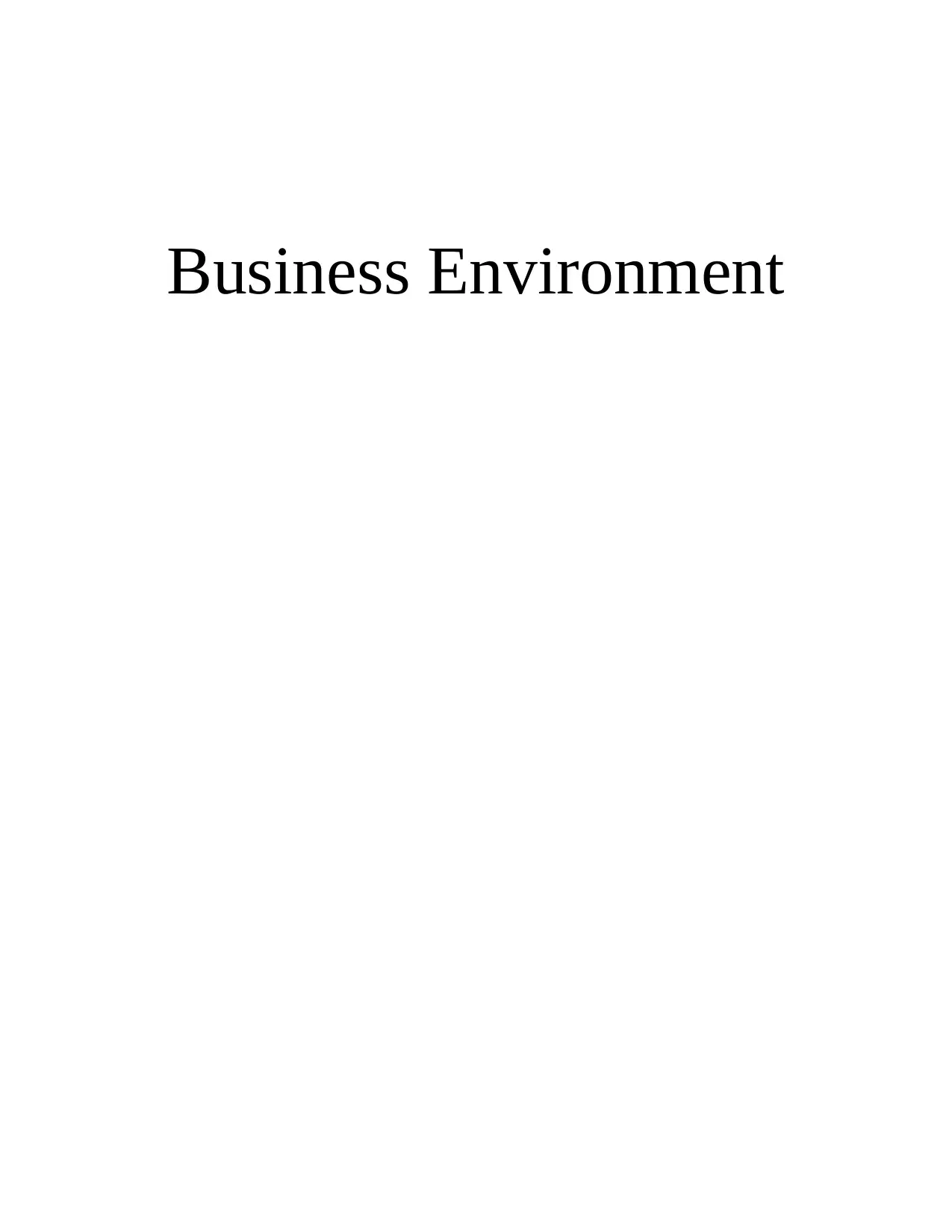
Business Environment
Paraphrase This Document
Need a fresh take? Get an instant paraphrase of this document with our AI Paraphraser
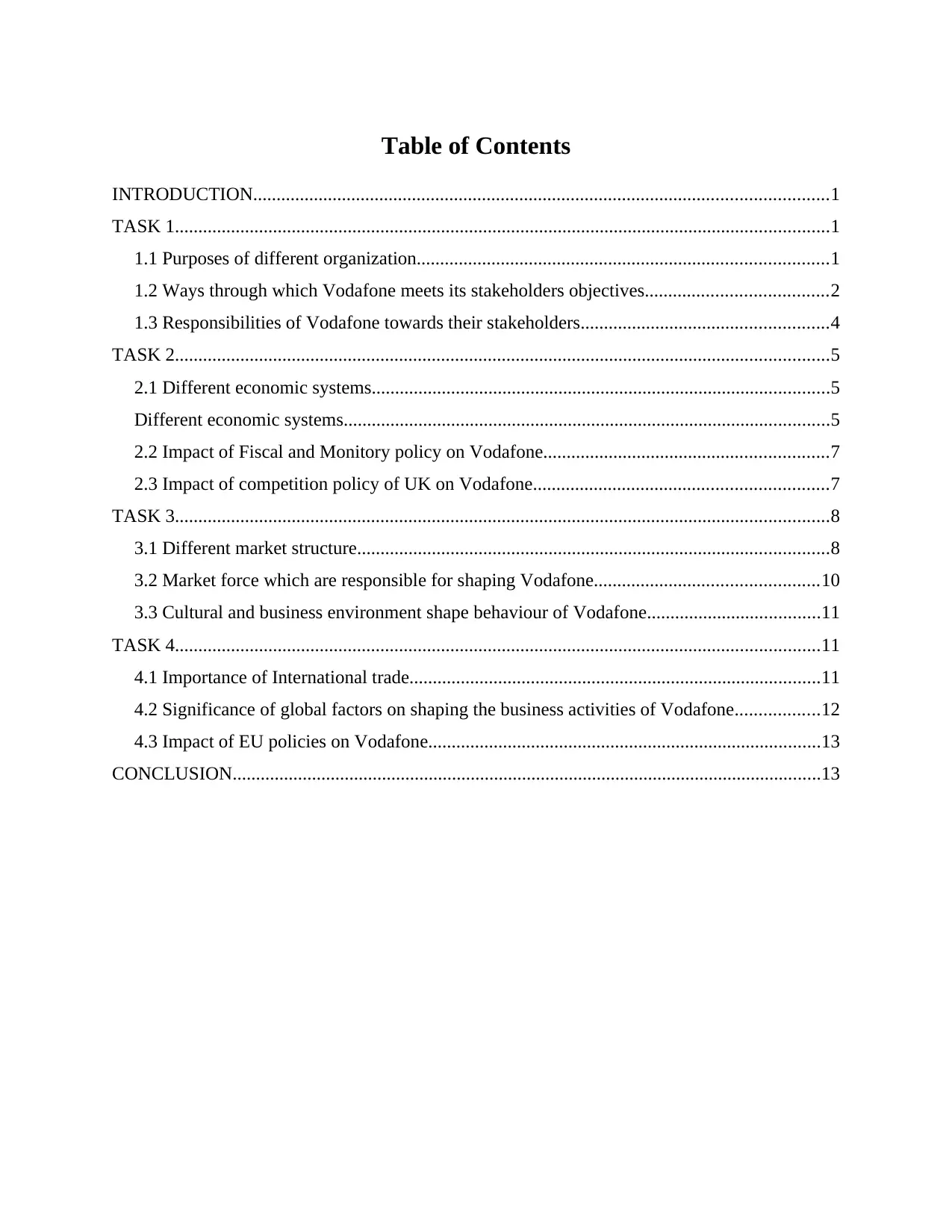
Table of Contents
INTRODUCTION...........................................................................................................................1
TASK 1............................................................................................................................................1
1.1 Purposes of different organization........................................................................................1
1.2 Ways through which Vodafone meets its stakeholders objectives.......................................2
1.3 Responsibilities of Vodafone towards their stakeholders.....................................................4
TASK 2............................................................................................................................................5
2.1 Different economic systems..................................................................................................5
Different economic systems........................................................................................................5
2.2 Impact of Fiscal and Monitory policy on Vodafone.............................................................7
2.3 Impact of competition policy of UK on Vodafone...............................................................7
TASK 3............................................................................................................................................8
3.1 Different market structure.....................................................................................................8
3.2 Market force which are responsible for shaping Vodafone................................................10
3.3 Cultural and business environment shape behaviour of Vodafone.....................................11
TASK 4..........................................................................................................................................11
4.1 Importance of International trade........................................................................................11
4.2 Significance of global factors on shaping the business activities of Vodafone..................12
4.3 Impact of EU policies on Vodafone....................................................................................13
CONCLUSION..............................................................................................................................13
INTRODUCTION...........................................................................................................................1
TASK 1............................................................................................................................................1
1.1 Purposes of different organization........................................................................................1
1.2 Ways through which Vodafone meets its stakeholders objectives.......................................2
1.3 Responsibilities of Vodafone towards their stakeholders.....................................................4
TASK 2............................................................................................................................................5
2.1 Different economic systems..................................................................................................5
Different economic systems........................................................................................................5
2.2 Impact of Fiscal and Monitory policy on Vodafone.............................................................7
2.3 Impact of competition policy of UK on Vodafone...............................................................7
TASK 3............................................................................................................................................8
3.1 Different market structure.....................................................................................................8
3.2 Market force which are responsible for shaping Vodafone................................................10
3.3 Cultural and business environment shape behaviour of Vodafone.....................................11
TASK 4..........................................................................................................................................11
4.1 Importance of International trade........................................................................................11
4.2 Significance of global factors on shaping the business activities of Vodafone..................12
4.3 Impact of EU policies on Vodafone....................................................................................13
CONCLUSION..............................................................................................................................13
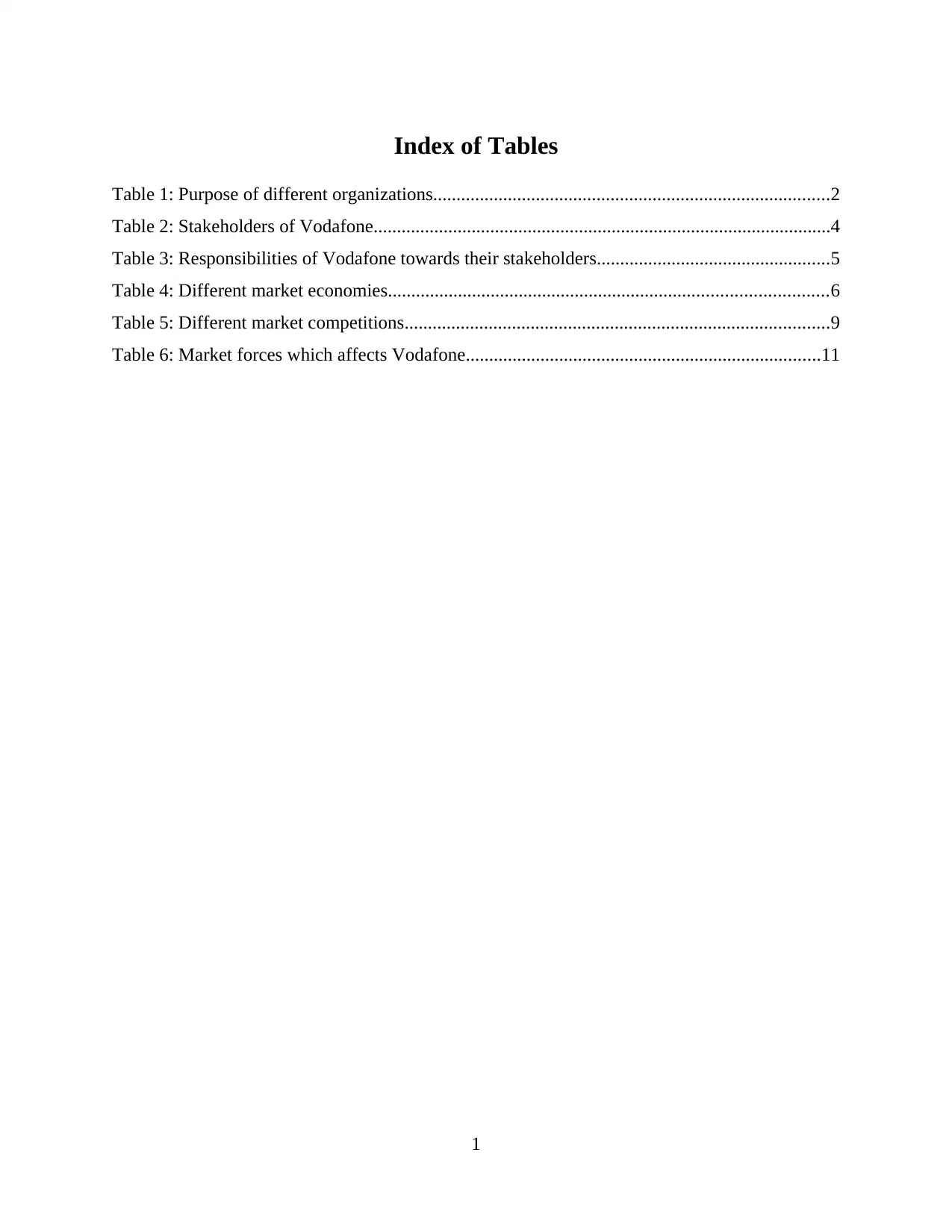
Index of Tables
Table 1: Purpose of different organizations.....................................................................................2
Table 2: Stakeholders of Vodafone..................................................................................................4
Table 3: Responsibilities of Vodafone towards their stakeholders..................................................5
Table 4: Different market economies..............................................................................................6
Table 5: Different market competitions...........................................................................................9
Table 6: Market forces which affects Vodafone............................................................................11
1
Table 1: Purpose of different organizations.....................................................................................2
Table 2: Stakeholders of Vodafone..................................................................................................4
Table 3: Responsibilities of Vodafone towards their stakeholders..................................................5
Table 4: Different market economies..............................................................................................6
Table 5: Different market competitions...........................................................................................9
Table 6: Market forces which affects Vodafone............................................................................11
1
⊘ This is a preview!⊘
Do you want full access?
Subscribe today to unlock all pages.

Trusted by 1+ million students worldwide
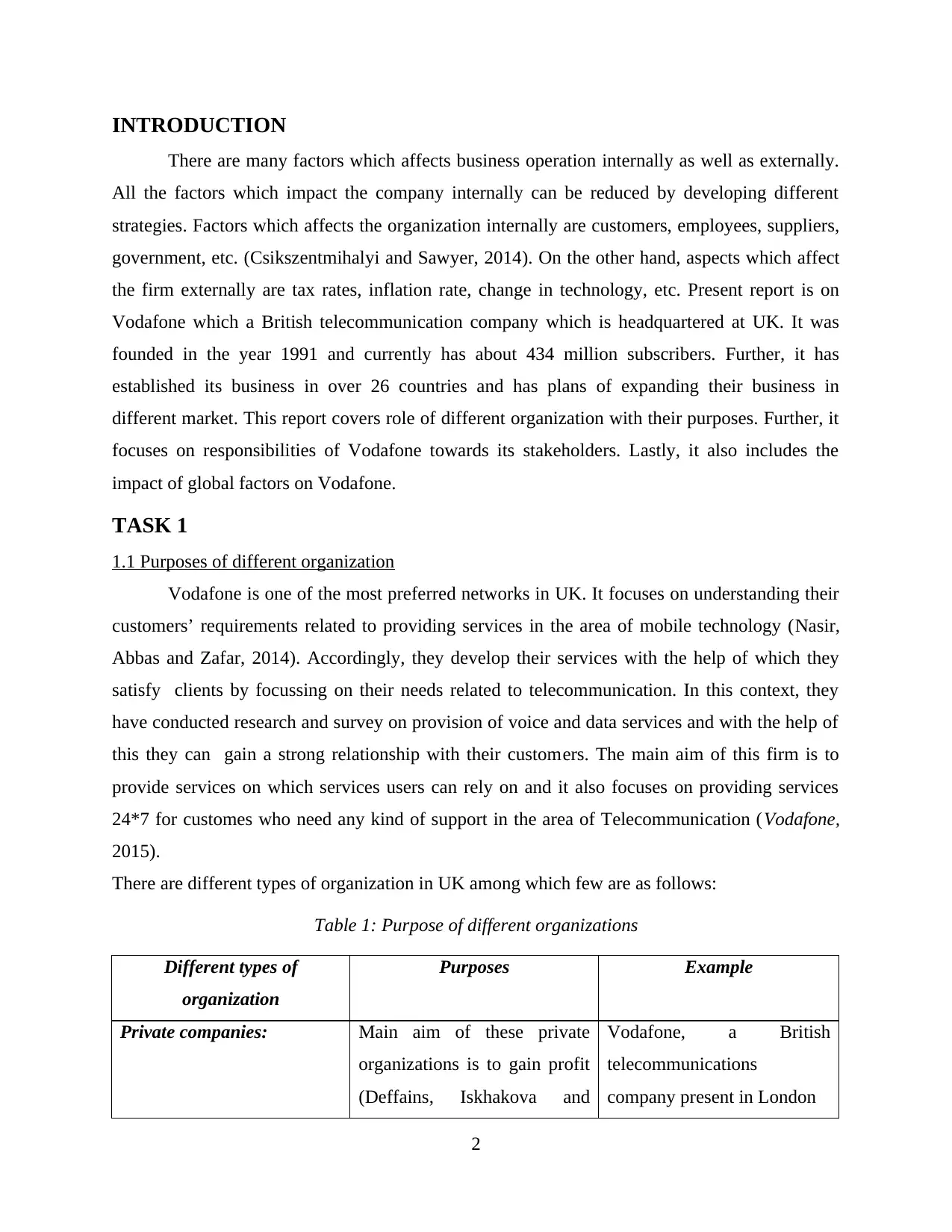
INTRODUCTION
There are many factors which affects business operation internally as well as externally.
All the factors which impact the company internally can be reduced by developing different
strategies. Factors which affects the organization internally are customers, employees, suppliers,
government, etc. (Csikszentmihalyi and Sawyer, 2014). On the other hand, aspects which affect
the firm externally are tax rates, inflation rate, change in technology, etc. Present report is on
Vodafone which a British telecommunication company which is headquartered at UK. It was
founded in the year 1991 and currently has about 434 million subscribers. Further, it has
established its business in over 26 countries and has plans of expanding their business in
different market. This report covers role of different organization with their purposes. Further, it
focuses on responsibilities of Vodafone towards its stakeholders. Lastly, it also includes the
impact of global factors on Vodafone.
TASK 1
1.1 Purposes of different organization
Vodafone is one of the most preferred networks in UK. It focuses on understanding their
customers’ requirements related to providing services in the area of mobile technology (Nasir,
Abbas and Zafar, 2014). Accordingly, they develop their services with the help of which they
satisfy clients by focussing on their needs related to telecommunication. In this context, they
have conducted research and survey on provision of voice and data services and with the help of
this they can gain a strong relationship with their customers. The main aim of this firm is to
provide services on which services users can rely on and it also focuses on providing services
24*7 for customes who need any kind of support in the area of Telecommunication (Vodafone,
2015).
There are different types of organization in UK among which few are as follows:
Table 1: Purpose of different organizations
Different types of
organization
Purposes Example
Private companies: Main aim of these private
organizations is to gain profit
(Deffains, Iskhakova and
Vodafone, a British
telecommunications
company present in London
2
There are many factors which affects business operation internally as well as externally.
All the factors which impact the company internally can be reduced by developing different
strategies. Factors which affects the organization internally are customers, employees, suppliers,
government, etc. (Csikszentmihalyi and Sawyer, 2014). On the other hand, aspects which affect
the firm externally are tax rates, inflation rate, change in technology, etc. Present report is on
Vodafone which a British telecommunication company which is headquartered at UK. It was
founded in the year 1991 and currently has about 434 million subscribers. Further, it has
established its business in over 26 countries and has plans of expanding their business in
different market. This report covers role of different organization with their purposes. Further, it
focuses on responsibilities of Vodafone towards its stakeholders. Lastly, it also includes the
impact of global factors on Vodafone.
TASK 1
1.1 Purposes of different organization
Vodafone is one of the most preferred networks in UK. It focuses on understanding their
customers’ requirements related to providing services in the area of mobile technology (Nasir,
Abbas and Zafar, 2014). Accordingly, they develop their services with the help of which they
satisfy clients by focussing on their needs related to telecommunication. In this context, they
have conducted research and survey on provision of voice and data services and with the help of
this they can gain a strong relationship with their customers. The main aim of this firm is to
provide services on which services users can rely on and it also focuses on providing services
24*7 for customes who need any kind of support in the area of Telecommunication (Vodafone,
2015).
There are different types of organization in UK among which few are as follows:
Table 1: Purpose of different organizations
Different types of
organization
Purposes Example
Private companies: Main aim of these private
organizations is to gain profit
(Deffains, Iskhakova and
Vodafone, a British
telecommunications
company present in London
2
Paraphrase This Document
Need a fresh take? Get an instant paraphrase of this document with our AI Paraphraser
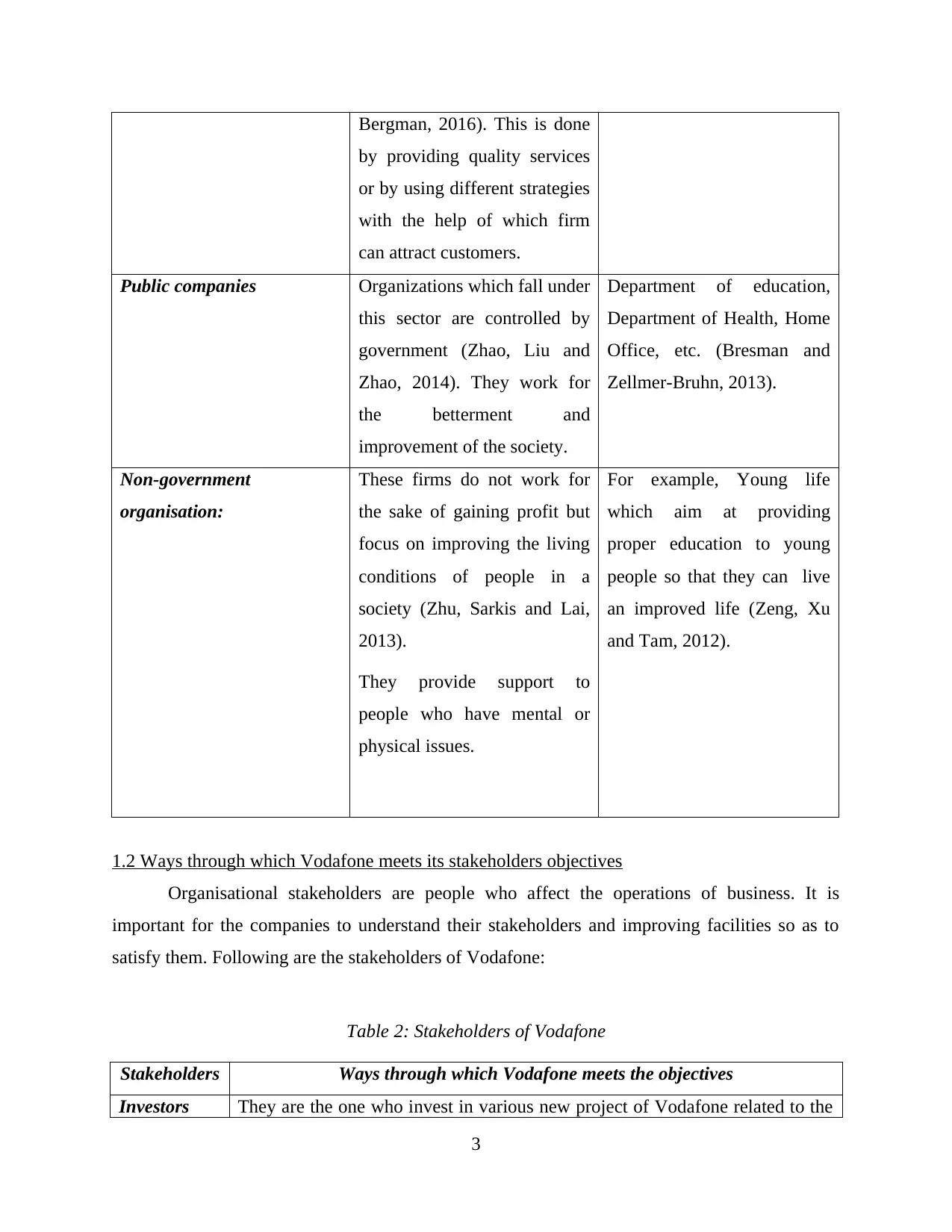
Bergman, 2016). This is done
by providing quality services
or by using different strategies
with the help of which firm
can attract customers.
Public companies Organizations which fall under
this sector are controlled by
government (Zhao, Liu and
Zhao, 2014). They work for
the betterment and
improvement of the society.
Department of education,
Department of Health, Home
Office, etc. (Bresman and
Zellmer-Bruhn, 2013).
Non-government
organisation:
These firms do not work for
the sake of gaining profit but
focus on improving the living
conditions of people in a
society (Zhu, Sarkis and Lai,
2013).
They provide support to
people who have mental or
physical issues.
For example, Young life
which aim at providing
proper education to young
people so that they can live
an improved life (Zeng, Xu
and Tam, 2012).
1.2 Ways through which Vodafone meets its stakeholders objectives
Organisational stakeholders are people who affect the operations of business. It is
important for the companies to understand their stakeholders and improving facilities so as to
satisfy them. Following are the stakeholders of Vodafone:
Table 2: Stakeholders of Vodafone
Stakeholders Ways through which Vodafone meets the objectives
Investors They are the one who invest in various new project of Vodafone related to the
3
by providing quality services
or by using different strategies
with the help of which firm
can attract customers.
Public companies Organizations which fall under
this sector are controlled by
government (Zhao, Liu and
Zhao, 2014). They work for
the betterment and
improvement of the society.
Department of education,
Department of Health, Home
Office, etc. (Bresman and
Zellmer-Bruhn, 2013).
Non-government
organisation:
These firms do not work for
the sake of gaining profit but
focus on improving the living
conditions of people in a
society (Zhu, Sarkis and Lai,
2013).
They provide support to
people who have mental or
physical issues.
For example, Young life
which aim at providing
proper education to young
people so that they can live
an improved life (Zeng, Xu
and Tam, 2012).
1.2 Ways through which Vodafone meets its stakeholders objectives
Organisational stakeholders are people who affect the operations of business. It is
important for the companies to understand their stakeholders and improving facilities so as to
satisfy them. Following are the stakeholders of Vodafone:
Table 2: Stakeholders of Vodafone
Stakeholders Ways through which Vodafone meets the objectives
Investors They are the one who invest in various new project of Vodafone related to the
3
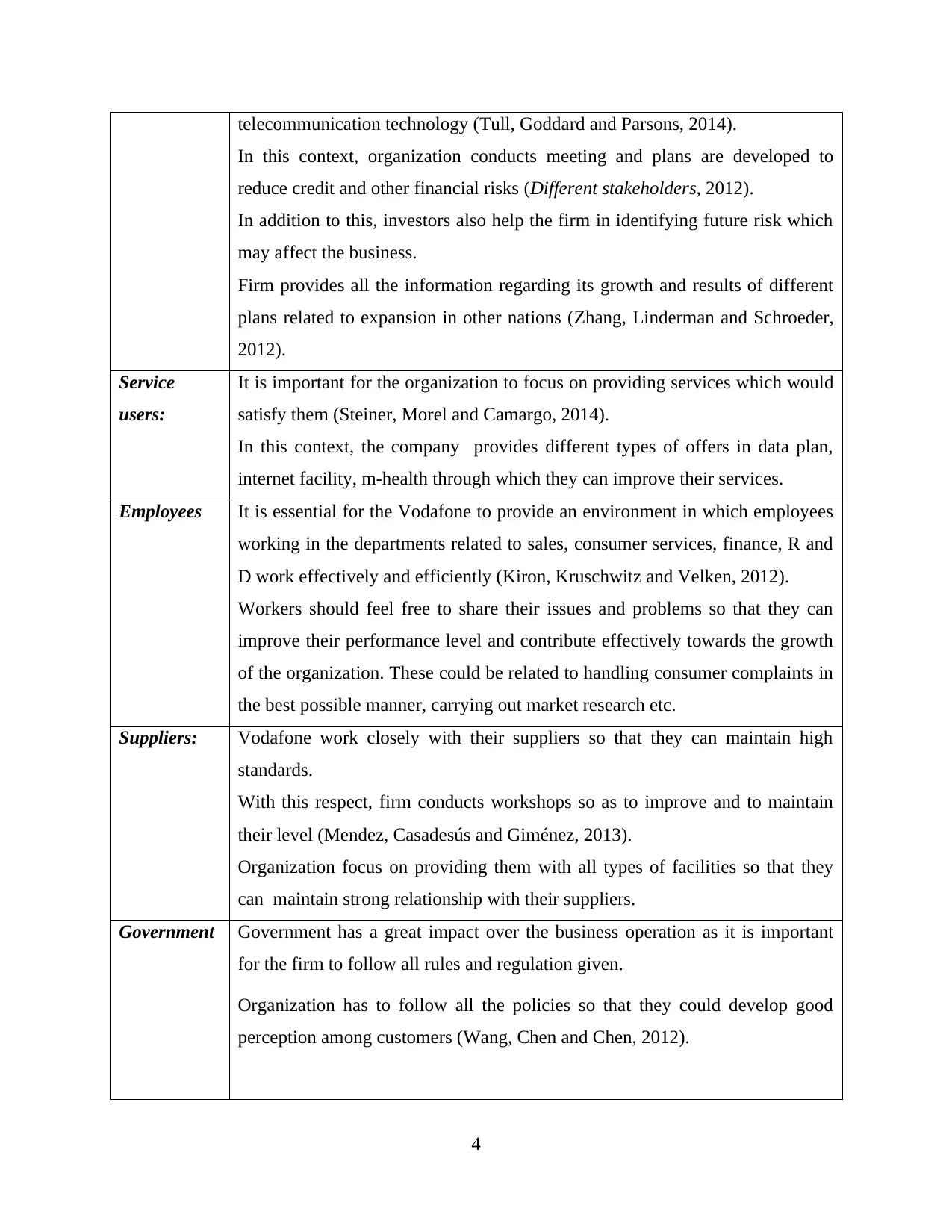
telecommunication technology (Tull, Goddard and Parsons, 2014).
In this context, organization conducts meeting and plans are developed to
reduce credit and other financial risks (Different stakeholders, 2012).
In addition to this, investors also help the firm in identifying future risk which
may affect the business.
Firm provides all the information regarding its growth and results of different
plans related to expansion in other nations (Zhang, Linderman and Schroeder,
2012).
Service
users:
It is important for the organization to focus on providing services which would
satisfy them (Steiner, Morel and Camargo, 2014).
In this context, the company provides different types of offers in data plan,
internet facility, m-health through which they can improve their services.
Employees It is essential for the Vodafone to provide an environment in which employees
working in the departments related to sales, consumer services, finance, R and
D work effectively and efficiently (Kiron, Kruschwitz and Velken, 2012).
Workers should feel free to share their issues and problems so that they can
improve their performance level and contribute effectively towards the growth
of the organization. These could be related to handling consumer complaints in
the best possible manner, carrying out market research etc.
Suppliers: Vodafone work closely with their suppliers so that they can maintain high
standards.
With this respect, firm conducts workshops so as to improve and to maintain
their level (Mendez, Casadesús and Giménez, 2013).
Organization focus on providing them with all types of facilities so that they
can maintain strong relationship with their suppliers.
Government Government has a great impact over the business operation as it is important
for the firm to follow all rules and regulation given.
Organization has to follow all the policies so that they could develop good
perception among customers (Wang, Chen and Chen, 2012).
4
In this context, organization conducts meeting and plans are developed to
reduce credit and other financial risks (Different stakeholders, 2012).
In addition to this, investors also help the firm in identifying future risk which
may affect the business.
Firm provides all the information regarding its growth and results of different
plans related to expansion in other nations (Zhang, Linderman and Schroeder,
2012).
Service
users:
It is important for the organization to focus on providing services which would
satisfy them (Steiner, Morel and Camargo, 2014).
In this context, the company provides different types of offers in data plan,
internet facility, m-health through which they can improve their services.
Employees It is essential for the Vodafone to provide an environment in which employees
working in the departments related to sales, consumer services, finance, R and
D work effectively and efficiently (Kiron, Kruschwitz and Velken, 2012).
Workers should feel free to share their issues and problems so that they can
improve their performance level and contribute effectively towards the growth
of the organization. These could be related to handling consumer complaints in
the best possible manner, carrying out market research etc.
Suppliers: Vodafone work closely with their suppliers so that they can maintain high
standards.
With this respect, firm conducts workshops so as to improve and to maintain
their level (Mendez, Casadesús and Giménez, 2013).
Organization focus on providing them with all types of facilities so that they
can maintain strong relationship with their suppliers.
Government Government has a great impact over the business operation as it is important
for the firm to follow all rules and regulation given.
Organization has to follow all the policies so that they could develop good
perception among customers (Wang, Chen and Chen, 2012).
4
⊘ This is a preview!⊘
Do you want full access?
Subscribe today to unlock all pages.

Trusted by 1+ million students worldwide
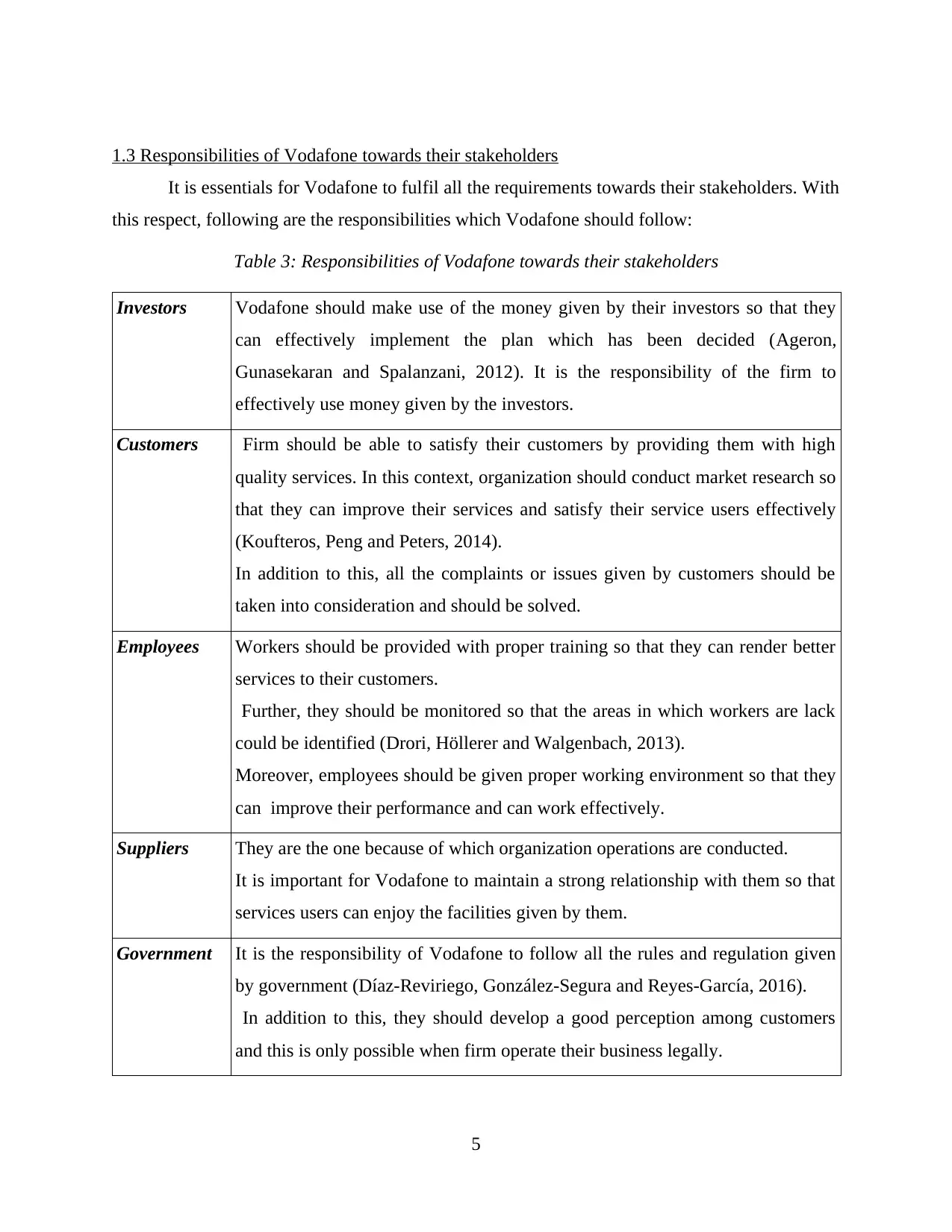
1.3 Responsibilities of Vodafone towards their stakeholders
It is essentials for Vodafone to fulfil all the requirements towards their stakeholders. With
this respect, following are the responsibilities which Vodafone should follow:
Table 3: Responsibilities of Vodafone towards their stakeholders
Investors Vodafone should make use of the money given by their investors so that they
can effectively implement the plan which has been decided (Ageron,
Gunasekaran and Spalanzani, 2012). It is the responsibility of the firm to
effectively use money given by the investors.
Customers Firm should be able to satisfy their customers by providing them with high
quality services. In this context, organization should conduct market research so
that they can improve their services and satisfy their service users effectively
(Koufteros, Peng and Peters, 2014).
In addition to this, all the complaints or issues given by customers should be
taken into consideration and should be solved.
Employees Workers should be provided with proper training so that they can render better
services to their customers.
Further, they should be monitored so that the areas in which workers are lack
could be identified (Drori, Höllerer and Walgenbach, 2013).
Moreover, employees should be given proper working environment so that they
can improve their performance and can work effectively.
Suppliers They are the one because of which organization operations are conducted.
It is important for Vodafone to maintain a strong relationship with them so that
services users can enjoy the facilities given by them.
Government It is the responsibility of Vodafone to follow all the rules and regulation given
by government (Díaz-Reviriego, González-Segura and Reyes-García, 2016).
In addition to this, they should develop a good perception among customers
and this is only possible when firm operate their business legally.
5
It is essentials for Vodafone to fulfil all the requirements towards their stakeholders. With
this respect, following are the responsibilities which Vodafone should follow:
Table 3: Responsibilities of Vodafone towards their stakeholders
Investors Vodafone should make use of the money given by their investors so that they
can effectively implement the plan which has been decided (Ageron,
Gunasekaran and Spalanzani, 2012). It is the responsibility of the firm to
effectively use money given by the investors.
Customers Firm should be able to satisfy their customers by providing them with high
quality services. In this context, organization should conduct market research so
that they can improve their services and satisfy their service users effectively
(Koufteros, Peng and Peters, 2014).
In addition to this, all the complaints or issues given by customers should be
taken into consideration and should be solved.
Employees Workers should be provided with proper training so that they can render better
services to their customers.
Further, they should be monitored so that the areas in which workers are lack
could be identified (Drori, Höllerer and Walgenbach, 2013).
Moreover, employees should be given proper working environment so that they
can improve their performance and can work effectively.
Suppliers They are the one because of which organization operations are conducted.
It is important for Vodafone to maintain a strong relationship with them so that
services users can enjoy the facilities given by them.
Government It is the responsibility of Vodafone to follow all the rules and regulation given
by government (Díaz-Reviriego, González-Segura and Reyes-García, 2016).
In addition to this, they should develop a good perception among customers
and this is only possible when firm operate their business legally.
5
Paraphrase This Document
Need a fresh take? Get an instant paraphrase of this document with our AI Paraphraser
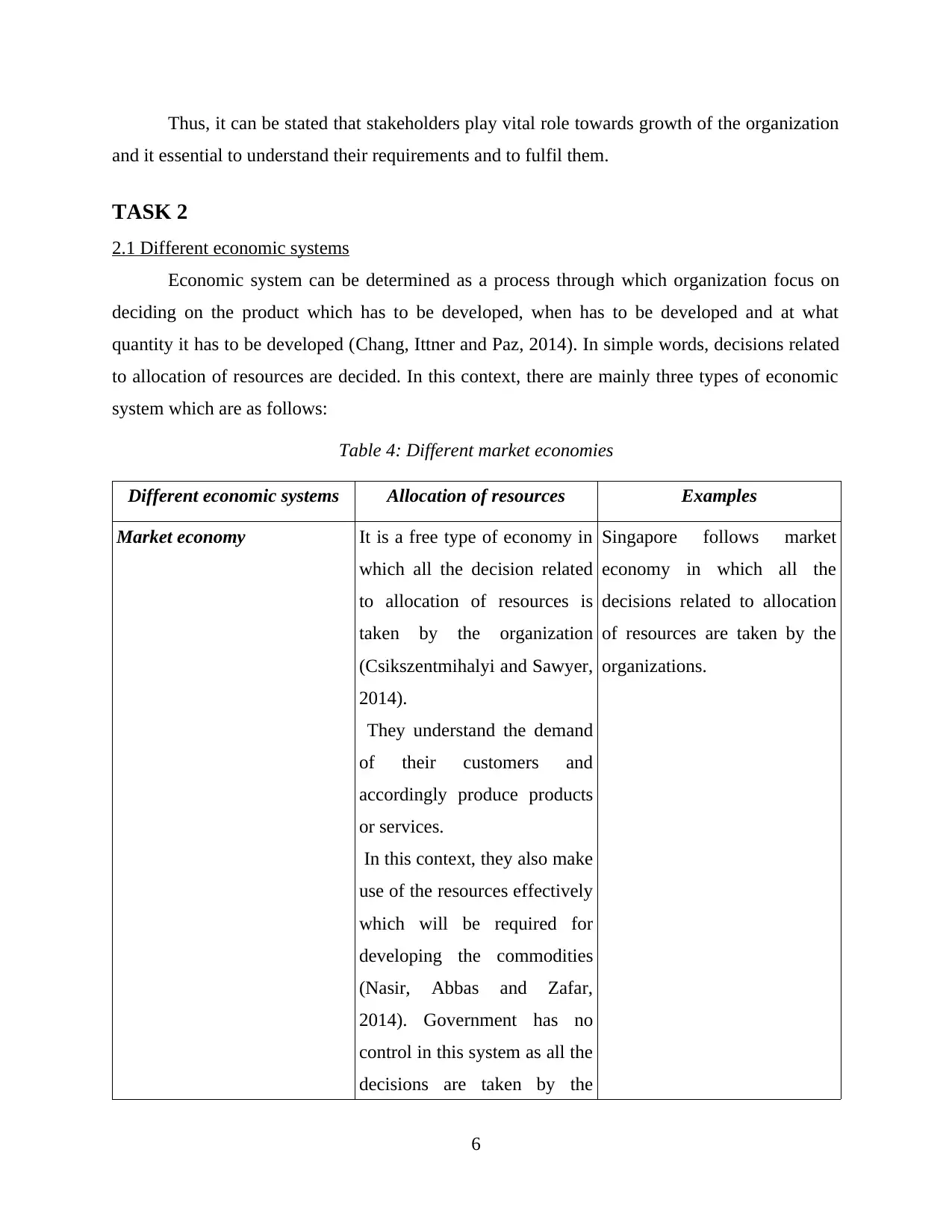
Thus, it can be stated that stakeholders play vital role towards growth of the organization
and it essential to understand their requirements and to fulfil them.
TASK 2
2.1 Different economic systems
Economic system can be determined as a process through which organization focus on
deciding on the product which has to be developed, when has to be developed and at what
quantity it has to be developed (Chang, Ittner and Paz, 2014). In simple words, decisions related
to allocation of resources are decided. In this context, there are mainly three types of economic
system which are as follows:
Table 4: Different market economies
Different economic systems Allocation of resources Examples
Market economy It is a free type of economy in
which all the decision related
to allocation of resources is
taken by the organization
(Csikszentmihalyi and Sawyer,
2014).
They understand the demand
of their customers and
accordingly produce products
or services.
In this context, they also make
use of the resources effectively
which will be required for
developing the commodities
(Nasir, Abbas and Zafar,
2014). Government has no
control in this system as all the
decisions are taken by the
Singapore follows market
economy in which all the
decisions related to allocation
of resources are taken by the
organizations.
6
and it essential to understand their requirements and to fulfil them.
TASK 2
2.1 Different economic systems
Economic system can be determined as a process through which organization focus on
deciding on the product which has to be developed, when has to be developed and at what
quantity it has to be developed (Chang, Ittner and Paz, 2014). In simple words, decisions related
to allocation of resources are decided. In this context, there are mainly three types of economic
system which are as follows:
Table 4: Different market economies
Different economic systems Allocation of resources Examples
Market economy It is a free type of economy in
which all the decision related
to allocation of resources is
taken by the organization
(Csikszentmihalyi and Sawyer,
2014).
They understand the demand
of their customers and
accordingly produce products
or services.
In this context, they also make
use of the resources effectively
which will be required for
developing the commodities
(Nasir, Abbas and Zafar,
2014). Government has no
control in this system as all the
decisions are taken by the
Singapore follows market
economy in which all the
decisions related to allocation
of resources are taken by the
organizations.
6
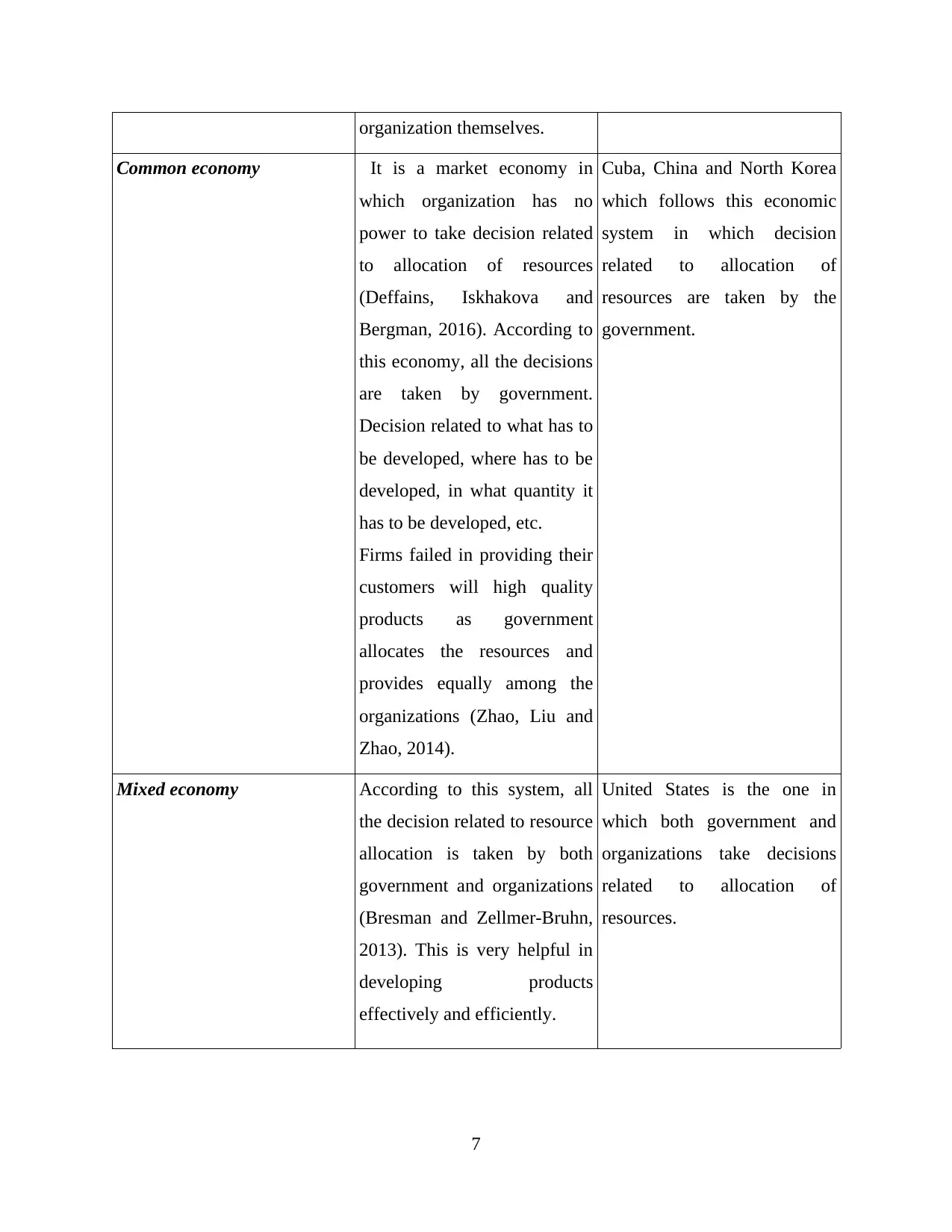
organization themselves.
Common economy It is a market economy in
which organization has no
power to take decision related
to allocation of resources
(Deffains, Iskhakova and
Bergman, 2016). According to
this economy, all the decisions
are taken by government.
Decision related to what has to
be developed, where has to be
developed, in what quantity it
has to be developed, etc.
Firms failed in providing their
customers will high quality
products as government
allocates the resources and
provides equally among the
organizations (Zhao, Liu and
Zhao, 2014).
Cuba, China and North Korea
which follows this economic
system in which decision
related to allocation of
resources are taken by the
government.
Mixed economy According to this system, all
the decision related to resource
allocation is taken by both
government and organizations
(Bresman and Zellmer-Bruhn,
2013). This is very helpful in
developing products
effectively and efficiently.
United States is the one in
which both government and
organizations take decisions
related to allocation of
resources.
7
Common economy It is a market economy in
which organization has no
power to take decision related
to allocation of resources
(Deffains, Iskhakova and
Bergman, 2016). According to
this economy, all the decisions
are taken by government.
Decision related to what has to
be developed, where has to be
developed, in what quantity it
has to be developed, etc.
Firms failed in providing their
customers will high quality
products as government
allocates the resources and
provides equally among the
organizations (Zhao, Liu and
Zhao, 2014).
Cuba, China and North Korea
which follows this economic
system in which decision
related to allocation of
resources are taken by the
government.
Mixed economy According to this system, all
the decision related to resource
allocation is taken by both
government and organizations
(Bresman and Zellmer-Bruhn,
2013). This is very helpful in
developing products
effectively and efficiently.
United States is the one in
which both government and
organizations take decisions
related to allocation of
resources.
7
⊘ This is a preview!⊘
Do you want full access?
Subscribe today to unlock all pages.

Trusted by 1+ million students worldwide
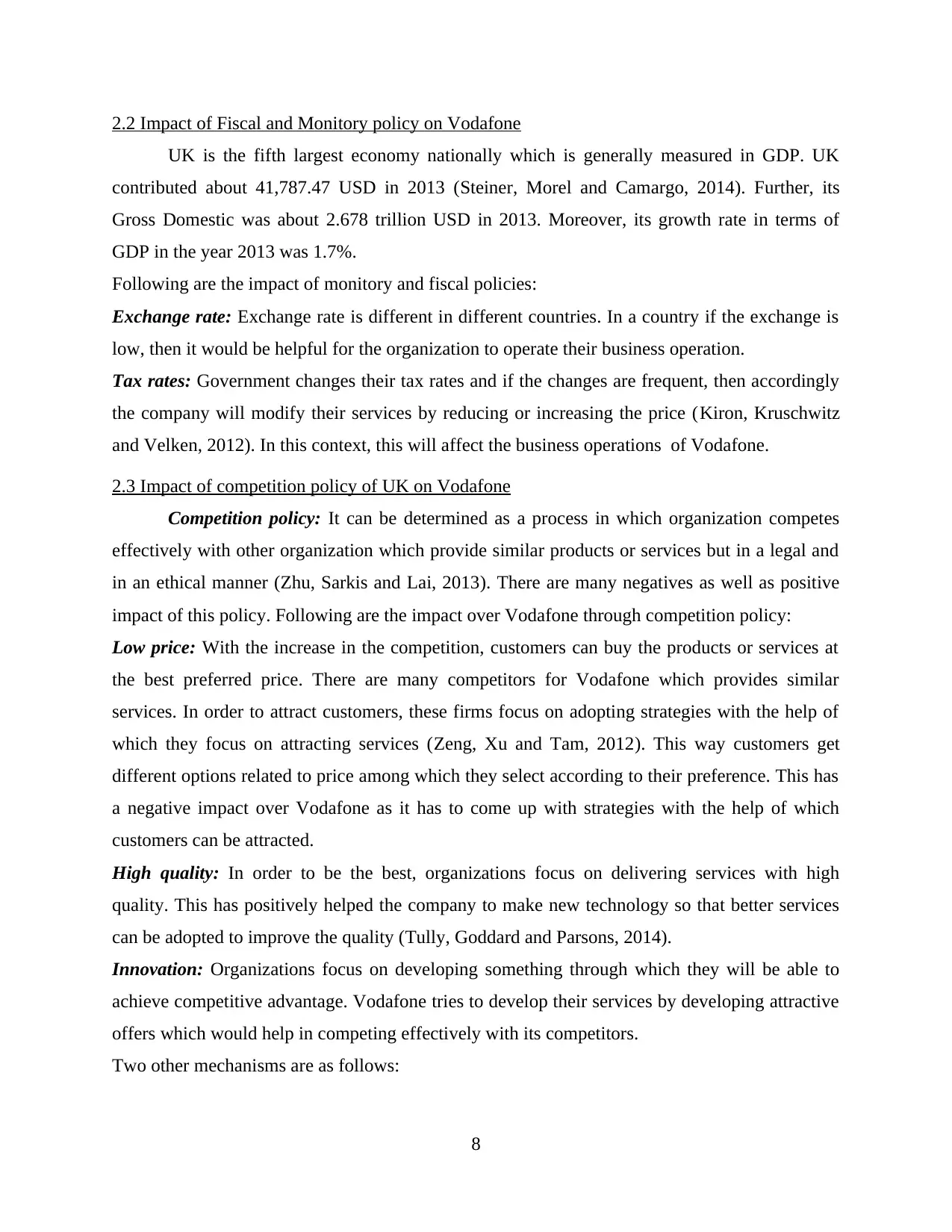
2.2 Impact of Fiscal and Monitory policy on Vodafone
UK is the fifth largest economy nationally which is generally measured in GDP. UK
contributed about 41,787.47 USD in 2013 (Steiner, Morel and Camargo, 2014). Further, its
Gross Domestic was about 2.678 trillion USD in 2013. Moreover, its growth rate in terms of
GDP in the year 2013 was 1.7%.
Following are the impact of monitory and fiscal policies:
Exchange rate: Exchange rate is different in different countries. In a country if the exchange is
low, then it would be helpful for the organization to operate their business operation.
Tax rates: Government changes their tax rates and if the changes are frequent, then accordingly
the company will modify their services by reducing or increasing the price (Kiron, Kruschwitz
and Velken, 2012). In this context, this will affect the business operations of Vodafone.
2.3 Impact of competition policy of UK on Vodafone
Competition policy: It can be determined as a process in which organization competes
effectively with other organization which provide similar products or services but in a legal and
in an ethical manner (Zhu, Sarkis and Lai, 2013). There are many negatives as well as positive
impact of this policy. Following are the impact over Vodafone through competition policy:
Low price: With the increase in the competition, customers can buy the products or services at
the best preferred price. There are many competitors for Vodafone which provides similar
services. In order to attract customers, these firms focus on adopting strategies with the help of
which they focus on attracting services (Zeng, Xu and Tam, 2012). This way customers get
different options related to price among which they select according to their preference. This has
a negative impact over Vodafone as it has to come up with strategies with the help of which
customers can be attracted.
High quality: In order to be the best, organizations focus on delivering services with high
quality. This has positively helped the company to make new technology so that better services
can be adopted to improve the quality (Tully, Goddard and Parsons, 2014).
Innovation: Organizations focus on developing something through which they will be able to
achieve competitive advantage. Vodafone tries to develop their services by developing attractive
offers which would help in competing effectively with its competitors.
Two other mechanisms are as follows:
8
UK is the fifth largest economy nationally which is generally measured in GDP. UK
contributed about 41,787.47 USD in 2013 (Steiner, Morel and Camargo, 2014). Further, its
Gross Domestic was about 2.678 trillion USD in 2013. Moreover, its growth rate in terms of
GDP in the year 2013 was 1.7%.
Following are the impact of monitory and fiscal policies:
Exchange rate: Exchange rate is different in different countries. In a country if the exchange is
low, then it would be helpful for the organization to operate their business operation.
Tax rates: Government changes their tax rates and if the changes are frequent, then accordingly
the company will modify their services by reducing or increasing the price (Kiron, Kruschwitz
and Velken, 2012). In this context, this will affect the business operations of Vodafone.
2.3 Impact of competition policy of UK on Vodafone
Competition policy: It can be determined as a process in which organization competes
effectively with other organization which provide similar products or services but in a legal and
in an ethical manner (Zhu, Sarkis and Lai, 2013). There are many negatives as well as positive
impact of this policy. Following are the impact over Vodafone through competition policy:
Low price: With the increase in the competition, customers can buy the products or services at
the best preferred price. There are many competitors for Vodafone which provides similar
services. In order to attract customers, these firms focus on adopting strategies with the help of
which they focus on attracting services (Zeng, Xu and Tam, 2012). This way customers get
different options related to price among which they select according to their preference. This has
a negative impact over Vodafone as it has to come up with strategies with the help of which
customers can be attracted.
High quality: In order to be the best, organizations focus on delivering services with high
quality. This has positively helped the company to make new technology so that better services
can be adopted to improve the quality (Tully, Goddard and Parsons, 2014).
Innovation: Organizations focus on developing something through which they will be able to
achieve competitive advantage. Vodafone tries to develop their services by developing attractive
offers which would help in competing effectively with its competitors.
Two other mechanisms are as follows:
8
Paraphrase This Document
Need a fresh take? Get an instant paraphrase of this document with our AI Paraphraser
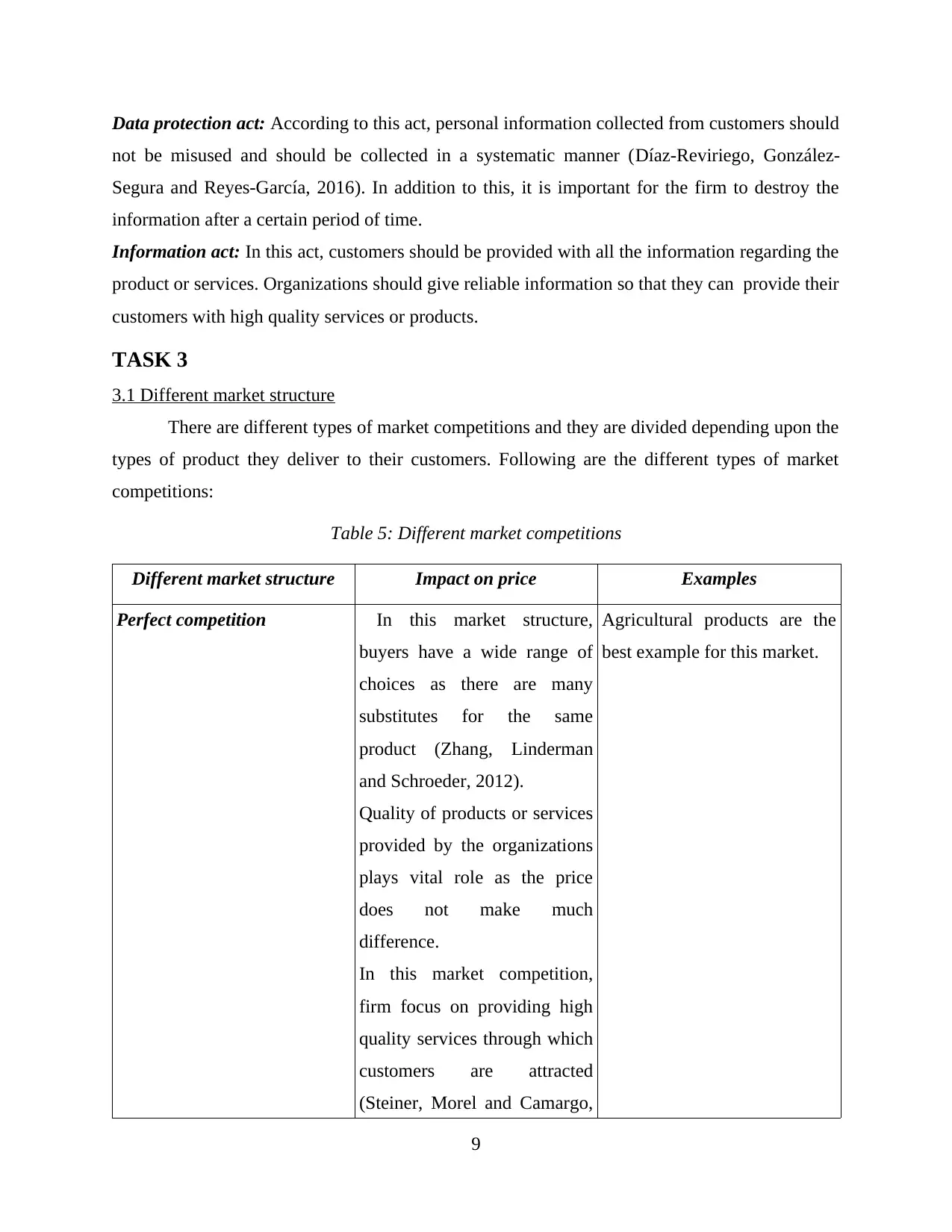
Data protection act: According to this act, personal information collected from customers should
not be misused and should be collected in a systematic manner (Díaz-Reviriego, González-
Segura and Reyes-García, 2016). In addition to this, it is important for the firm to destroy the
information after a certain period of time.
Information act: In this act, customers should be provided with all the information regarding the
product or services. Organizations should give reliable information so that they can provide their
customers with high quality services or products.
TASK 3
3.1 Different market structure
There are different types of market competitions and they are divided depending upon the
types of product they deliver to their customers. Following are the different types of market
competitions:
Table 5: Different market competitions
Different market structure Impact on price Examples
Perfect competition In this market structure,
buyers have a wide range of
choices as there are many
substitutes for the same
product (Zhang, Linderman
and Schroeder, 2012).
Quality of products or services
provided by the organizations
plays vital role as the price
does not make much
difference.
In this market competition,
firm focus on providing high
quality services through which
customers are attracted
(Steiner, Morel and Camargo,
Agricultural products are the
best example for this market.
9
not be misused and should be collected in a systematic manner (Díaz-Reviriego, González-
Segura and Reyes-García, 2016). In addition to this, it is important for the firm to destroy the
information after a certain period of time.
Information act: In this act, customers should be provided with all the information regarding the
product or services. Organizations should give reliable information so that they can provide their
customers with high quality services or products.
TASK 3
3.1 Different market structure
There are different types of market competitions and they are divided depending upon the
types of product they deliver to their customers. Following are the different types of market
competitions:
Table 5: Different market competitions
Different market structure Impact on price Examples
Perfect competition In this market structure,
buyers have a wide range of
choices as there are many
substitutes for the same
product (Zhang, Linderman
and Schroeder, 2012).
Quality of products or services
provided by the organizations
plays vital role as the price
does not make much
difference.
In this market competition,
firm focus on providing high
quality services through which
customers are attracted
(Steiner, Morel and Camargo,
Agricultural products are the
best example for this market.
9
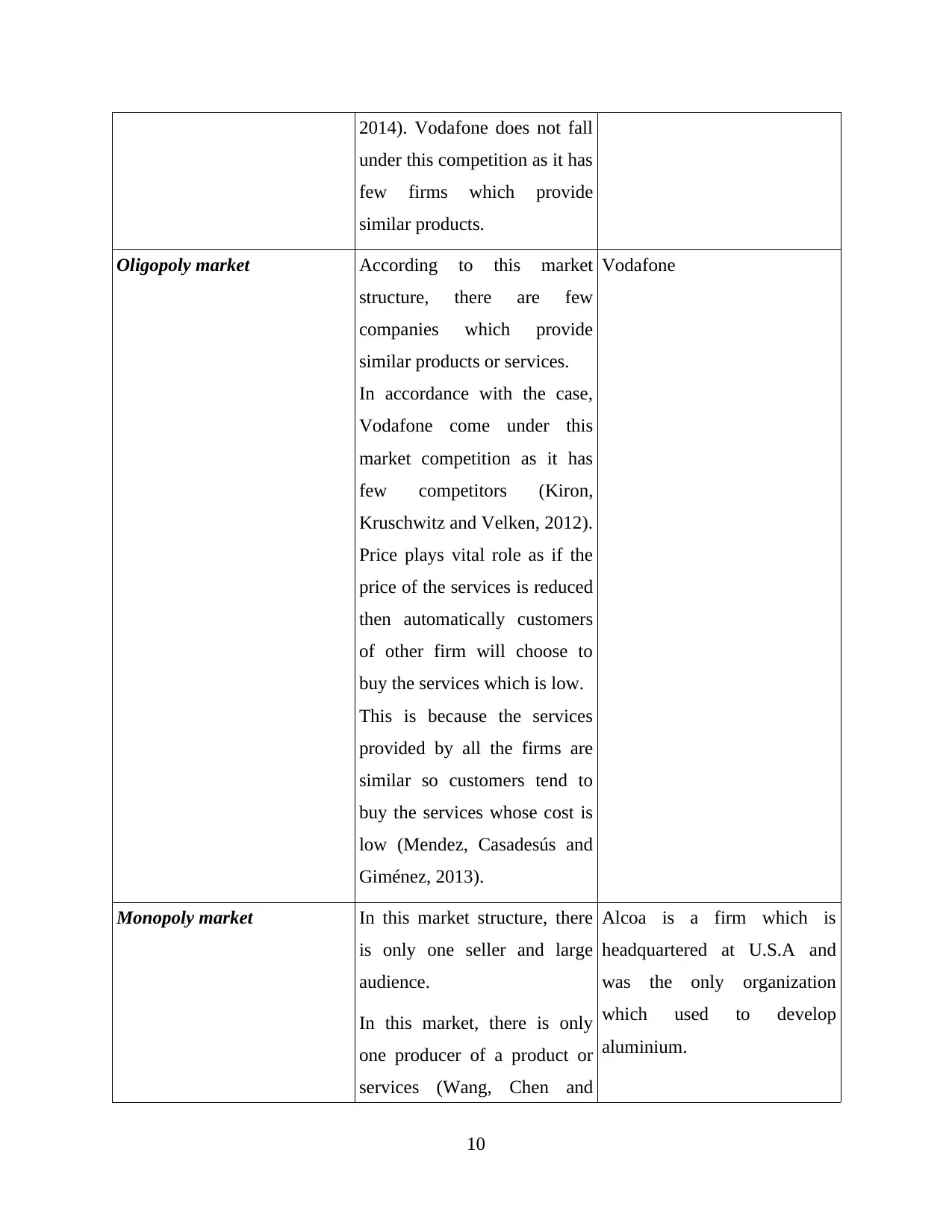
2014). Vodafone does not fall
under this competition as it has
few firms which provide
similar products.
Oligopoly market According to this market
structure, there are few
companies which provide
similar products or services.
In accordance with the case,
Vodafone come under this
market competition as it has
few competitors (Kiron,
Kruschwitz and Velken, 2012).
Price plays vital role as if the
price of the services is reduced
then automatically customers
of other firm will choose to
buy the services which is low.
This is because the services
provided by all the firms are
similar so customers tend to
buy the services whose cost is
low (Mendez, Casadesús and
Giménez, 2013).
Vodafone
Monopoly market In this market structure, there
is only one seller and large
audience.
In this market, there is only
one producer of a product or
services (Wang, Chen and
Alcoa is a firm which is
headquartered at U.S.A and
was the only organization
which used to develop
aluminium.
10
under this competition as it has
few firms which provide
similar products.
Oligopoly market According to this market
structure, there are few
companies which provide
similar products or services.
In accordance with the case,
Vodafone come under this
market competition as it has
few competitors (Kiron,
Kruschwitz and Velken, 2012).
Price plays vital role as if the
price of the services is reduced
then automatically customers
of other firm will choose to
buy the services which is low.
This is because the services
provided by all the firms are
similar so customers tend to
buy the services whose cost is
low (Mendez, Casadesús and
Giménez, 2013).
Vodafone
Monopoly market In this market structure, there
is only one seller and large
audience.
In this market, there is only
one producer of a product or
services (Wang, Chen and
Alcoa is a firm which is
headquartered at U.S.A and
was the only organization
which used to develop
aluminium.
10
⊘ This is a preview!⊘
Do you want full access?
Subscribe today to unlock all pages.

Trusted by 1+ million students worldwide
1 out of 18
Related Documents
Your All-in-One AI-Powered Toolkit for Academic Success.
+13062052269
info@desklib.com
Available 24*7 on WhatsApp / Email
![[object Object]](/_next/static/media/star-bottom.7253800d.svg)
Unlock your academic potential
Copyright © 2020–2026 A2Z Services. All Rights Reserved. Developed and managed by ZUCOL.




